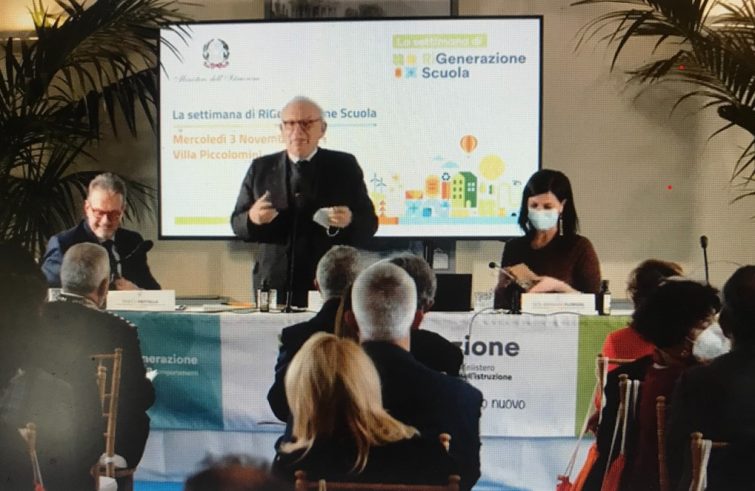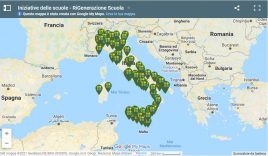
The Ministry of Education has allocated €2 million for projects promoting schools’ green and cultural transition as part of the School Re-Generation Plan (Piano RiGenerazione Scuola) presented a few days ago in Rome at the opening of the first National Week (3-8 November) on the educational role of schools to restore intergenerational relationships, promote the awareness that sustainable development is possible if it meets the needs of present generations and does not jeopardise future ones, learning to adopt new lifestyles. Barbara Floridia, Undersecretary for Education in charge of Green and Cultural Transition in schools, illustrated the programme. Minister Patrizio Bianchi opened and concluded the conference and announced that he would be in Glasgow today to participate in the joint meeting of Ministers of Education and Ministers of Environment “Together for tomorrow: Education and Climate Action”, in the framework of Cop26:
“We agreed to hold a joint meeting on schools and the environment co-chaired by the UK and myself as G20 Education Chair. It will build on our experience and we should all be very proud of it.”
For Minister Bianchi, a joint commitment for the planet is needed, moving
“from sustainability to regeneration”.
A regeneration vision “that starts with schools and regenerates them at the same time” through a project designed to become “a pillar for new knowledge, new behaviours, new structures and new opportunities.”
“We are the first European country with a systemic and structural sustainability plan, and we are implementing a comprehensive civic education curriculum, supplementing it with environmental education.
A Sustainable Schools Week will be held every year offering a wide range of initiatives to help schools,” Floridia explained, pointing out that a Green Community comprising institutional, national and supranational public partners has been set up at the Ministry of Education to implement the Plan. The purpose of the Plan is “to systematise existing activities, replicate good practices already carried out by some schools, offer training resources for teachers, devote resources to sustainability education activities and create educational links with recognised partners.” Eco news and information on calls for proposals will be available on the project website.
The Ministry has earmarked two million euro for dedicated projects: each school or network of schools will be allocated up to €25,000; €800,000 have been earmarked for non-profit organisations. The “School and Food” portal will provide new food education tools. The Undersecretary Floridia recalled that the NRP provides for allocation of resources aimed at the creation of dedicated school canteens and announced the launch of a sustainable mobility platform to improve pupils’ and school staff’s commutes. “The NRP also provides funding for the construction of new schools. Furthermore, €1 billion has been allocated to improve school efficiency and safety, and for the creation of green areas with a total of 2,000 gardens and green spaces in schools”, she concluded.
 Meanwhile, schools throughout the country have already launched competitions, workshops, projects, initiatives and activities to promote sustainability, recycling and waste reduction among the younger generations, raising awareness about green transition and on creating a new inclusive and sustainable economic model.
Meanwhile, schools throughout the country have already launched competitions, workshops, projects, initiatives and activities to promote sustainability, recycling and waste reduction among the younger generations, raising awareness about green transition and on creating a new inclusive and sustainable economic model.
The words of the Green Community. “Health starts with children. If properly trained, nobody can bring health literacy home better than the children themselves. The same applies to sustainable mobility”, said Andrea Lenzi, MD, president of Health City Institute, member of the Green Community, for whom “health education as a common good starts from schools, with the prospect of networking experts and experiences.” Carabinieri Forestry, Environmental and Agri-food Unit commander Pietro Marzo outlined the Unit’s activities for territorial and natural resources protection, including “training for sustainable mobility, waste reduction, recycling, countering the use of single-use products and supporting biodiversity. “We must ensure that the Green community acts as a think tank for new and coherent responses to an important challenge that must be met,” said Vanessa Pallucchi, vice-president of the Italian environmental organisation Legambiente. Martina Alemanno ( ASVIS) outlined initiatives for promoting environmental education for the young with the “aim of increasing both the number of organisations involved and the services offered to the younger generations.” “Our mission is to instil a new eco-friendly digital language and literacy into the daily lives of young people, and raise public awareness about the need for urgent changes by fostering new lifestyles and habits,” stated RAI director for social causes Giovanni Parapini. GSE sole director, Andrea Ripa di Meana, summarised the task of the Gestore dei Servizi Energetici (GSE, state-owned company which manages renewable energy incentives,) as follows: “Working towards environmental sustainability by promoting renewable energy sources and energy efficiency, encouraging green transition investments.”












